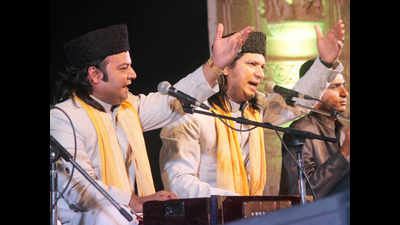- News
- City News
- delhi News
- Cultural giants to come to JNU ‘ashram’ for a week of music, art
Trending
This story is from May 30, 2019
Cultural giants to come to JNU ‘ashram’ for a week of music, art
No mobile phones or laptops, waking up at 3.30 am (Brahma muhurta) for yoga and meditation, ‘holistic' lunch, dinner at 5 pm

Warsi brothers will perform on June 4
NEW DELHI: No mobile phones or laptops, waking up at 3.30 am (Brahma muhurta) for yoga and meditation, ‘holistic' lunch, dinner at 5 pm, cultural presentations of Indian classical dance, music and arts in the evening by renowned artistes — these will form the routine for around 1,500 student delegates for seven days when Jawaharlal Nehru University turns into an ashram run by SPIC MACAY as it celebrates its golden jubilee year.
Between June 3 and 9, the Society for Promotion of Indian Classical Music and Culture Amongst Youth, more popular by its acronym of SPIC MACAY, will showcase the tapestry of Indian cultural heritage and expose the Indian youth to the music of legends such as Ustad Amjad Ali Khan and Pandit Hariprasad Chaurasia and have them participating in workshops on Madhubani art (painting done with fingers, twigs, brushes, nibs and matchsticks using natural pigments).

“We want to reach out every child by 2025,” declared Dr Kiran Seth, founder of SPIC MACAY. “At present, Lakshmi has overtaken Saraswati and there is overemphasis on money but little thought beyond what is tangible. We have to pierce through the veil of ignorance.”
From day two, the wake-up time will be 3.30am with nine different types of yoga and meditation from 4am to 7am. The hour after this is set aside for ‘shram daan’ for the youths to conduct a cleanliness drive in the university. Between 9 and noon from June 4, there will be workshops on crafts, arts, music and dance conducted by national awardees. Every day between 1.15pm and 1.45pm the delegates will have ‘yog nidra’, or holistic sleep.
“There are countless studies that have examined the impact of culture on behaviour, cognition and emotion. They point to the fact that the cultural practices that we acquire during childhood can affect our brains as adults,” said M Jagadesh Kumar, JNU vice-chancellor. “Therefore, exposing students to cultural activities has a scientific basis.”
Kumar said that JNU was happy to host the International SPIC MACAY Convention as part of its golden jubilee celebrations. The JNU community will have the rare opportunity to participate in concerts by renowned artistes for free. He also revealed that 150 students from Jammu & Kashmir will come to the university for the event.
Between June 3 and 9, the Society for Promotion of Indian Classical Music and Culture Amongst Youth, more popular by its acronym of SPIC MACAY, will showcase the tapestry of Indian cultural heritage and expose the Indian youth to the music of legends such as Ustad Amjad Ali Khan and Pandit Hariprasad Chaurasia and have them participating in workshops on Madhubani art (painting done with fingers, twigs, brushes, nibs and matchsticks using natural pigments).

“We want to reach out every child by 2025,” declared Dr Kiran Seth, founder of SPIC MACAY. “At present, Lakshmi has overtaken Saraswati and there is overemphasis on money but little thought beyond what is tangible. We have to pierce through the veil of ignorance.”
Calling the JNU event bigger than the six international conventions the youth organisation has conducted in the IITs and IIM Calcutta, SPIC MACAY’s director (media) Suman Doonga elaborated on the ashram at the central university. She said on the first day, after registration and allotment of accommodation, the young delegates will watch a Sattriya dance by ‘Bayanacharya’ Ghanakanta Bora Muktiyar, guru of the classical dance tradition of Assam, followed by an interaction. A ‘holistic’ lunch with satvik (non-fried and non-spicy) food will be served. Dr Seth will then conduct an orientation session for the students and teachers before a holistic dinner at 5 pm. “From 6pm to 9pm each day, different artistes will perform,” added Doonga.
From day two, the wake-up time will be 3.30am with nine different types of yoga and meditation from 4am to 7am. The hour after this is set aside for ‘shram daan’ for the youths to conduct a cleanliness drive in the university. Between 9 and noon from June 4, there will be workshops on crafts, arts, music and dance conducted by national awardees. Every day between 1.15pm and 1.45pm the delegates will have ‘yog nidra’, or holistic sleep.
“There are countless studies that have examined the impact of culture on behaviour, cognition and emotion. They point to the fact that the cultural practices that we acquire during childhood can affect our brains as adults,” said M Jagadesh Kumar, JNU vice-chancellor. “Therefore, exposing students to cultural activities has a scientific basis.”
Kumar said that JNU was happy to host the International SPIC MACAY Convention as part of its golden jubilee celebrations. The JNU community will have the rare opportunity to participate in concerts by renowned artistes for free. He also revealed that 150 students from Jammu & Kashmir will come to the university for the event.
End of Article
FOLLOW US ON SOCIAL MEDIA










